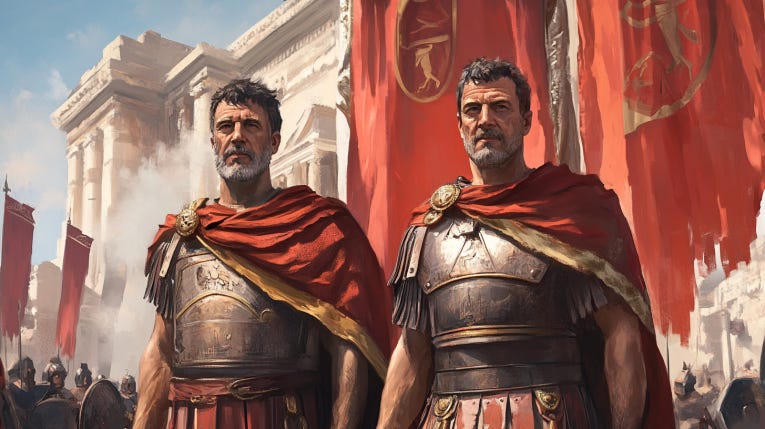Empire America: Reflections on Rome
While the Globalized-West is still in a state of flux, if we are following the Roman Script, where are we?
Donald Trump was not supposed to be elected to office. This image was not supposed to grace our headlines. He was supposed to be shot and killed as an example to others before he touched the levers of power again. We are are off-script. History, it seems, does not repeat. But it does rhyme. Save for the survival of Donald Trump, we’re almost beat-for-beat matching ancient history. That’s the script.
If one were to track the progress of the American Empire against the historic Roman Empire, one would find an unreasonable number of similarities. It makes sense, the United States is a republic, founded on the Roman model, with a similar cultural background and producing a near-identical economic breakout. The United States is a Republic with a Senate and an Executive branch similar to the Consuls and Tribunes. Like Rome, the United States has Byzantine legal and tax codes so complex it’s basically impossible for the average citizen to comprehend.
pun intended
Unlike Rome, the Supreme Court of the United States functions semi-autonomously, and appears to (thus far) be more effective at reigning in the more extreme overreaches of executive power. Also, the United States has so many state agencies that it’s nearly impossible to keep track of them all. An individual citizen must be an expert in EPA regulations to modify their vehicle, FCC regulations to broadcast radio, and ATF regulations to understand the difference between legal and illegal modifications to firearms.
Digital technology and communications definitely mitigates the negative effects of these legal codes, but introduces a degree of policy-enforcement that’d be impossible without instant communications.
The United States resembles the ancient Roman Republic, but it is not the same entity. The US has a diverse set of unique problems and solutions uplifted by high technology in a way that Rome never had to deal with. The History of the United States, however, correlates oddly closely.
The Empire began as a small break-out nation founded on the cultural backbone of smaller nations across the sea to the East. It was founded as a colony and later grew into a mercantile Empire. Embracing its own identity and cementing its colonial past, the nation was mostly isolationist. A number of self-centered wars among its eastern cultural progenitors forced it to step in. Its former cultural origins became proxies and later formed portions of a trade network that spanned the known world.
To get the elephant out of the room, the obvious: Donald Trump was supposed to be shot and killed. Most closely, he resembles the Brothers Gracchi in Roman history. They were killed when they challenged the status quo. Donald Trump survived the attempt.
The Gracchi Brothers
Toward the end of the Republic era of Rome, exactly 75 years before the rise of Caesar, the Gracchi brothers came to power, elected Tribunes of the plebs. Rome had been going through a radical economic expansion for the last 60 years or so in their conquest of Italia. Captured soldiers were sold as slaves in Roman markets. Slave labor is cheap, so wealthy land owners would have slaves till the fields while poor land owners would go off to serve in the military and sell their land.
Cost of living increased dramatically. The Gracchi brothers were effectively real-estate tycoons who entered this environment and sought public office. They were elected as populist candidates promising land reforms. First the senate tried to ignore them, then when that failed the Gracchi brothers were painted as tyrants. After the brothers were elected to office, the senate threatened them and engaged in lawfare to bankrupt the family. After seeking to ascend to public office again the senate had had enough. To make a long story short, the senate killed them both and threw their bodies in the river to make an example to others that would dare destabilize the status quo. Of course, this didn’t solve the systemic problems, but it did solve the immediate one: an uppity couple of populists challenging the status quo.
Over time, challengers to the status quo learn from the mistakes of previous attempts, they get smarter, and they get meaner.
75 years later, Caesar rose to power and attempted to institute his own reforms. The senators killed him too, leading to the rise of Augustus 30 years after the death of Julius. Augustus had learned from the mistakes made by the Gracchi brothers and Julius Caesar alike: Augustus put 300 senators to the sword and claimed the imperial throne. After fucking around for a century, the senate finally found out.
Donald Trump is a wealthy real-estate tycoon who entered politics after the United States had grown complacent in its territory. Automation led to a surplus of labor; the boomtimes turned into a stagnant ossified economy where those who already have wealth lord it over those who do not. Quality of life goes down as cost of living goes up.
Unlike the Gracchi brothers, the incompetent left-wing sniper used by the senate to eliminate their populist rival was sub-par. The sniper missed. Donald Trump now stands within a few days of taking the oath of office and reclaiming his position as an elected populist intent on reforming the political system. The fact that Donald Trump survived that particular assassination attempt is as close to the “hand of god” as I’ve ever seen. It has radically altered the course of contemporary American history. Probably thousands of years of future-history as well.
What Comes Next?
If we continue in resemblance to the Roman model of history, the United States is closing in on its Imperial age. It will not be the same type of empire that Rome produced, but it will display some similar effects on the surrounding world. It may be that Donald Trump kicks off a period of cultural change that’s then maintained by JD Vance and a series of other future leaders for the next few generations. If that’s the case, we are about to undergo dramatic cultural shifts.
If one were to follow Roman history as a model, the next phase of American history would resemble the late-republic era. During the late republic, the Empire was stretched too thin. Rather than fixing the problems at home, the Empire sought to mitigate problems through territorial conquest. It was wildly successful in territorial conquest, and the conquered territories brought in new resources while also exacerbating problems regarding land (wealth) inequalities. Effectively conquest maintains internal stability in the short term, but only the short term.
This is a period marked by radical expansion, heroic imperial figures and transitioning from a mercantile Empire into a territorial Empire. This is one reason that it’s likely the United States will, in the long-term, make good on Donald Trump’s statements about Greenland and Canada.
While those statements are partially in jest for the moment, the long-term interests of the United States are transitioning into a desire for territorial and population conquest. The resources (raw minerals and petroleum) gained from territorial conquest may well outweigh potential losses. Additionally, a resultant economic rising tide will maintain stability among the general population for a few more decades. Quality of life would begin improving again, especially if Canadians and Greenlanders weren’t given full citizenship status.
The United States is in the process of creating (much to the chagrin of actual citizens) a serf-class made up of illegal migrants. Were the United States to codify a Patrician (citizen) and Plebian (serf) class into law, the distinction could itself enhance cultural stability: “at least we aren’t the serfs.” If directed well, the additional labor could actually cause a significant rise in the median quality of life for the American citizen at the expense of the new serf class. While such a change would necessitate abandonment of the American egalitarian ideals… Rome did something similar at a similar point in their history.
The declining demographics further supports this concept. While US citizens are entirely unwilling to have their livelihood stolen by H1B foreigners, citizens are far more likely to accept the creation of a plebian class… as long as they aren’t in it. Observe popular progressive culture to see how willing the average citizen is to utilize deeply immoral foreign labor. Creating a “resident-worker” class with limited rights would be something that the American culture could accept as long as those “resident-workers” are subservient to the actual US citizens.
Something to think about.
The first step in creating a resident-worker class would be the revocation of birthright citizenship. Something that’s already widely discussed in populist circles. In this hypothetical future-history, the United States declares an end to birthright citizenship. Greenland then votes to join the United States, an action blocked by Denmark. The United States annexes the territory and dares any one to stop them. Greenlanders are welcomed as US citizens, but only (and this is emphasized) because they voted to join the United States.
Denmark attempts a counter invasion and a general stops them without needing to fire a shot. He’s awarded heroic for his heroic action and gains a position of extreme political prominence. The man works with the next administration to organize the conquest of Canada. This is a conquest, and the man is a military genius. By the time Canadians know what’s hit them, the fight is over. Again, triumphant, the future general returns home to acclaim and seeks political office.
The US congress is wary of a man with this much populist support. This could be another Trumpian type of figure. So the US congress and their allies in the media paint him as a tyrant. The general refuses the moniker and claims power any way. He is assassinated shortly thereafter, but his son has already won sufficient political clout that he becomes the figure head of a popular revolt.
After a year or two of fighting, the Generals son marches into the senate with the National Guard and puts the senators to the sword. Canadians become a permanent serf class, and Mexicans are pushed into that class as well. As resource shortages mount after a few more generations, the latest Emperor begins looking at Mexico the way Trump is now looking at Canada.
In the book, Breaking Together, it is stated that the average American utilizes roughly 300 humans worth of work in a day. This occurs in the form of petroleum and other energy sources. While that number will obviously need to shrink in the face of energy shortages, it is entirely possible to supplement petroleum energy with other humans. The creation of a “resident-worker” class in the United States could create a sufficient source of supplemental energy to support relatively modern life styles. Not “slavery” per-se, more of a kind of “worker who doesn’t get to say no.”
At least that’s what the tag line will be.
What’s Different?
The United States, ultimately, is not Rome. The United States is undergoing unique phenomena that will probably cause us to stray much further from the script than a mere failed assassination attempt against Donald Trump. Some things are fundamentally different between now in the United States, and then.
Systems collapse
The United States of America operates on a highly complex system of trade and economic production. The extreme efficiency is also prone to systems collapse. That is, it’s much easier to pull over to the side of the road when a wheel breaks on a horse-drawn cart than it is to do so when a single bolt falls out of a jet engine. When everything is working well, the jet engine is faster and more efficient. If something goes wrong, however, hyper-complex high-energy systems are prone to shocking collapse.
When a single windows security update bricked half the professional computers in the country last autumn, the results were catastrophic. Relatively small interruptions to our hyper-complex systems can have apocalyptic results. Financial systems, travel systems, communications systems. If a critical port city closes for more than a week, the economic effects are nation-wide. These type of systems-collapse failures incentive more “safe” types of engagements with foreign adversaries. A full scale invasion is not only risky due to the war, it’s also risky due to potential interruptions to trade and industry.
Resource Shortages
Resource shortages are on the horizon. Copper, zinc, antimony, chips and various metals and precious metals are not unlimited. In Rome, there were shortages, but they didn’t become catastrophic shortages until the late 2nd century. On earth, right now, global resource shortages are starting to radically drive up prices. Something as basic as enough copper to make solar panels and electric vehicles has become a very real point of contention in international economies. On the one hand, this will further drive American leaders to seek out additional real-estate. On the other hand, it dramatically slows the rate at which militaries can be rebuilt. No longer can we simply recruit a million more soldiers, the real bottle-neck is building a million more soldiers worth of equipment.
[Analysis/Review] The Limits To Growth
The Limits to Growth is a scientific publication based on a number of computer simulations performed in the 60s and 70s. While the book uses a scientific and disconnected approach to the mathematics and models, the authors are not. Put simply, the Limits to Growth discusses series of simulations based on resource scarcity, human population, energy avail…
In this way, the United States is uniquely well positioned. The civilian arms market in the US is second to none, and the average interested citizen is better armed and trained than the average soldier in 90% of the global militaries. Because it takes so long to rebuild a military, the fact that the US can effectively out-source defense to its own civilian populace (on their own dime), the US military can be much more cavalier about getting into engagements. The rest of the world will not be able to afford to take risks with military engagements, because if they lose half their equipment they can’t replace it. The US military can take more risks because any attempt to invade the mainland US is suicidal.
Demographic Decline
Rome experienced a catastrophic demographic decline… but not until after the 2nd century, well into the Imperial era. The global demographic decline is radically reshaping cultures and nations. In the United States, the demographic decline is likely to be the largest economic and logistical hurdle to Empire. Of course, this is an issue of labor, not an issue of “number of citizens.” Thus, it would make sense that many politicians and tycoons are incentivized to bring in more foreign labor. If the only way to get that through an America First sentimentality is to create a class of serfs, so be it. Hell, that’s what they’re already doing.
While one cannot claim to predict the future, there are a number of radical parallels. We should be alert in watching how the national culture shifts. The survival of Donald Trump to the presidency (5 days away as of this writing) may allow the Republic era of the United States to last longer. It may, alternatively, allow the United States to transition into an Imperial cultural mindset without the need for an Emperor. Or it may do nothing. Leave a comment, where do you think we’re going with all this?







![[Book Review] Breaking Together](https://substackcdn.com/image/fetch/$s_!kC1f!,w_1300,h_650,c_fill,f_auto,q_auto:good,fl_progressive:steep,g_auto/https%3A%2F%2Fsubstack-post-media.s3.amazonaws.com%2Fpublic%2Fimages%2F7c930854-b9fa-4ee1-9452-e3ce705ae2a3_959x1360.jpeg)
![[Analysis/Review] The Limits To Growth](https://substackcdn.com/image/fetch/$s_!QjaV!,w_1300,h_650,c_fill,f_auto,q_auto:good,fl_progressive:steep,g_auto/https%3A%2F%2Fsubstack-post-media.s3.amazonaws.com%2Fpublic%2Fimages%2Faeb83685-cd18-4b16-bc46-6c1262ebac45_663x1000.jpeg)
An excellent article. I can see the US expanding, swallowing up more territory. However government capacity in the US is in decline, as is patriotism. Due to this, the US (and all other governments in the world, bar North Korea) will have to delegate more governance to regional areas and non-governmental organisations. A military draft is non-viable in the US, so the manpower for building this deformed empire will be fulfilled through mercenaries (likely predominantly USian) and immigrant soldiers fighting for citizenship. Governance of these new territories too may be delegated to local governments or private companies (or local governments *in name only* that are functionally private companies) with "areas of responsibility". These would provide bare-bones services and maintain order, infrastructure and tax collection, in return for a slice of those taxes and natural resource kickbacks. These people would become a political force that gains power through conquest, and would act as a feedback loop to conquer more until exhaustion.
Essentially a big issue is that many people's vision of the future don't take into account declining state capacity - the ability of governments is and will become increasingly limited compared to their peak in the 1930s to 1970s. (Just look at how the US government has utterly failed to stop drug addiction over the past 50 years). This school of thought is called neomedievalism and I intend to delve into it more, you should look into it if you haven't already.
You called Trump ending birthright citizenship. Serf-class it is.